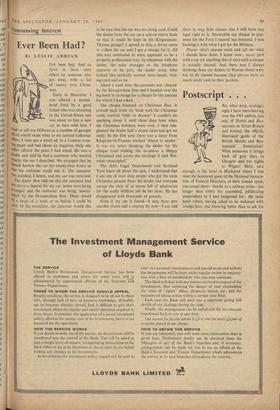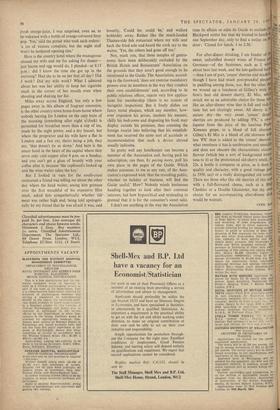Postscript . . .
Am, what deep, nostalgic sighs I have been heaving over the 1961 edition, just out, of Hotels and Res- taurants in Great Britain and Ireland, the official, illustrated guide of the British Hotels and Res-
taurants' Association! What memories it brings back of grey days in Glasgow and wet nights in Wigan! Here, sure enough, is the hotel in Blackpool where I was once the honoured guest of the National Associa- tion of Funeral Directors, at their annual spree, marooned there—thanks to a railway strike—for longer than either the assembled, jollificating undertakers or I had bargained for: the same hotel where, having asked to be wakened with orange-juice and knowing better than to ask for
fresh orange-juice, I was surprised, even so, to be wakened with a bottle of orange-coloured fizzy pop. 'Yes,' said the porter who took such orders: 'a lot of visitors complain, but the night staff won't be bothered opening tins.'
Here is the country hotel where the manageress abused my wife and me for asking for dinner— just bacon and egg would do, I pleaded—at 8.15 p.m.: did I know the time she got up in the morning? Had she to be on her feet all day? Did 1 work? Did my wife work? What I admired about her was her ability to keep her cigarette stuck in the corner of her mouth even when shouting and shaking her fist.
Miles away across England, but only a few pages away in this album of fragrant souvenirs, is the other country-town home-from-home where nobody leaving for London on the only train of the morning (something after eight o'clock) is permitted for breakfast more than a cup of tea, made by the night porter, and a dry biscuit, but where the proprietor and his wife have a flat in London and a fast car, theirs being a job, they say, 'that doesn't tie us down.' And here is the smart hotel in the heart of the capital where they serve only cold supper after 8 p.m. on a Sunday, and you can't get a glass of brandy with your coffee after it, because 'the cupboard's locked up and the wine waiter takes the key.'
But I looked in vain for the south-coast restaurant a friend was telling me about the other day where the head waiter, seeing him grimace over the first mouthful of his expensive fillet steak, asked him sympathetically whether the meat was rather high and, being told apologeti- cally by my friend that he was afraid it was, said breezily, 'Could be; could be,' and walked bobbishly away. Rather like the much-lauded Thames-side fish restaurant where my wife sent back the fried sole and heard the cook say to the waiter, 'Yes, the others had gone off too.'
Not, mark you, that these temples of gastro- nomy have been deliberately excluded by the British Hotels and Restaurants' Association on the grounds that they aren't good enough to be mentioned in the Guide. The Association, accord- ing to the foreword, 'does not exercise mandatory powers over its members in the way they conduct their own establishments' and, according to its public relations officer, rejects very few applica- tions for membership (there is no system of incognito inspection). But it freely dishes out fancy metal plaques, which any member, how- ever impudent his prices, insolent his manner, chilly his bedrooms and disgusting his food, may display outside his premises, thus cozening the foreign tourist into believing that his establish- ment has received the same sort of accolade or recommendation that such a device abroad usually indicates.
So pretty well any hotelkeeper can become a member of the Association and, having paid his subscription, can then, by paying more, puff his own place in the pages of the Guide. Which makes nonsense, to me at any rate, of the Asso- ciation's expressed wish 'that the travelling public, whether on holiday or business, will find the Guide useful.' How? Nobody minds businesses banding together to look after their common interests, but how hypocritical and misleading to pretend that it is for the consumer's sweet sake.
I don't see anything in the way the Association
runs its affairs or edits its Guide to exclude the Blackpool oyster bar that we wanted to lunch at. one September day, only to find a notice on the door: 'Closed for lunch, 1 to 2.30.'
For after-dinner drinking, I am fonder of the sweet, unfortified dessert wines of France and Germany—of the Sauternes, such as I wrote about here last week, and the late-gathered hocks —than I am of port, 'cream' sherries and madeira. though I have had much post-prandial pleasure in paddling among those, too. But the other del we wound up a luncheon at Gilbey's with She firm's best old dessert sherry, El Mio, which struck me as an admirable choice for those wh° like an after-dinner wine that is full and rich to taste but not cloyingly sweet. All sherry is hi nature dry—the very sweet 'cream' dessert sherries are produced by adding 'PX,' a sweet liqueur from the juice of the luscious Pcdt0 Ximenes grape, to a blend of full olorosos. Gilbey's El Mio is a blend of old olorosos with less 'PX' than is added to the 'cream' sherrie what sweetness it has is unobtrusive and unsickli and does not obscure the characteristic oloroS flavour (which has a sort of background bitter' ness to it) or the pronounced old-sherry smell. Al 22s. a bottle it compares in price, as it does IP quality and character, with a good vintage port (a 1950, say) or a really distinguished old tawny' There are those who like old sherries of this sort with a full-flavoured cheese, such as a BIUO Cheshire or a Double Gloucester, but my owe choice for an accompanying after-dinner dish would be walnuts.
CYRIL RAI



































 Previous page
Previous page